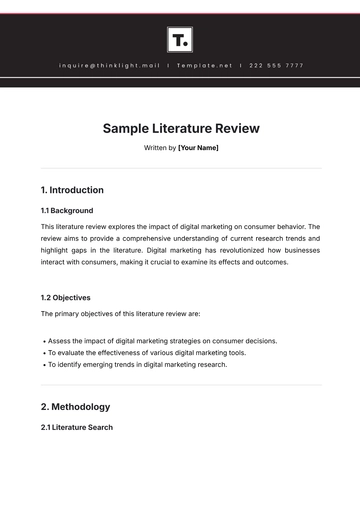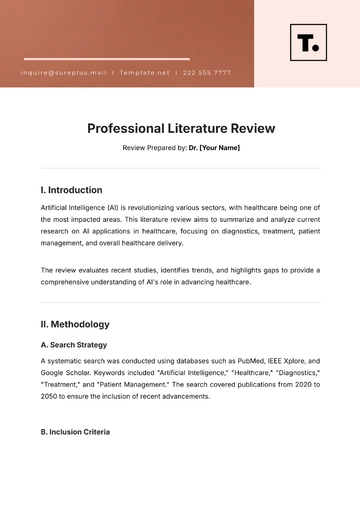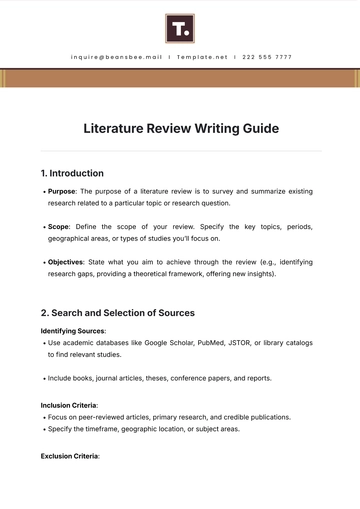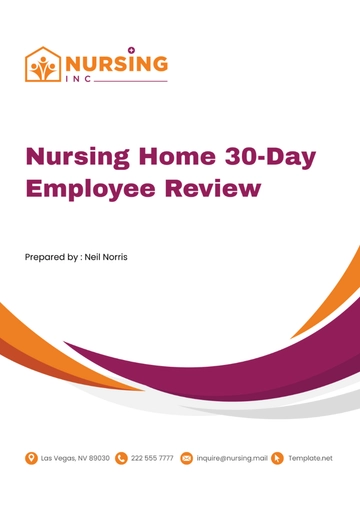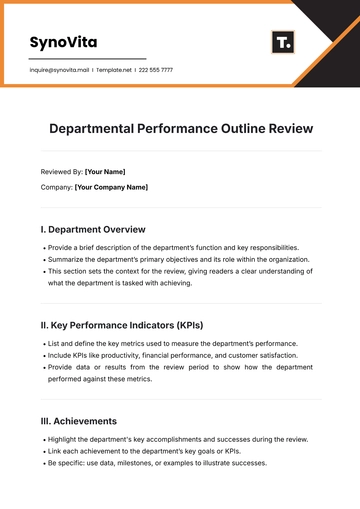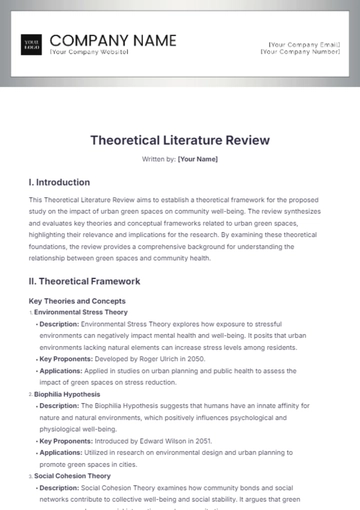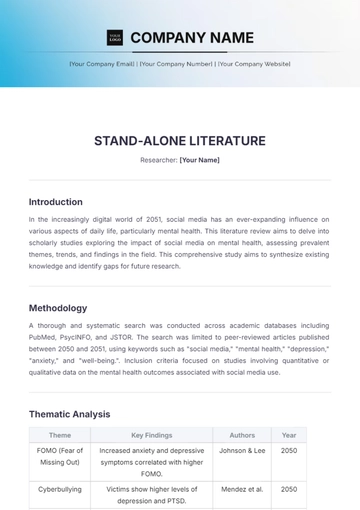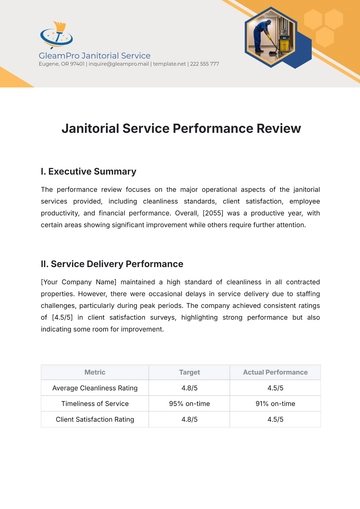Free Integrative Literature Review
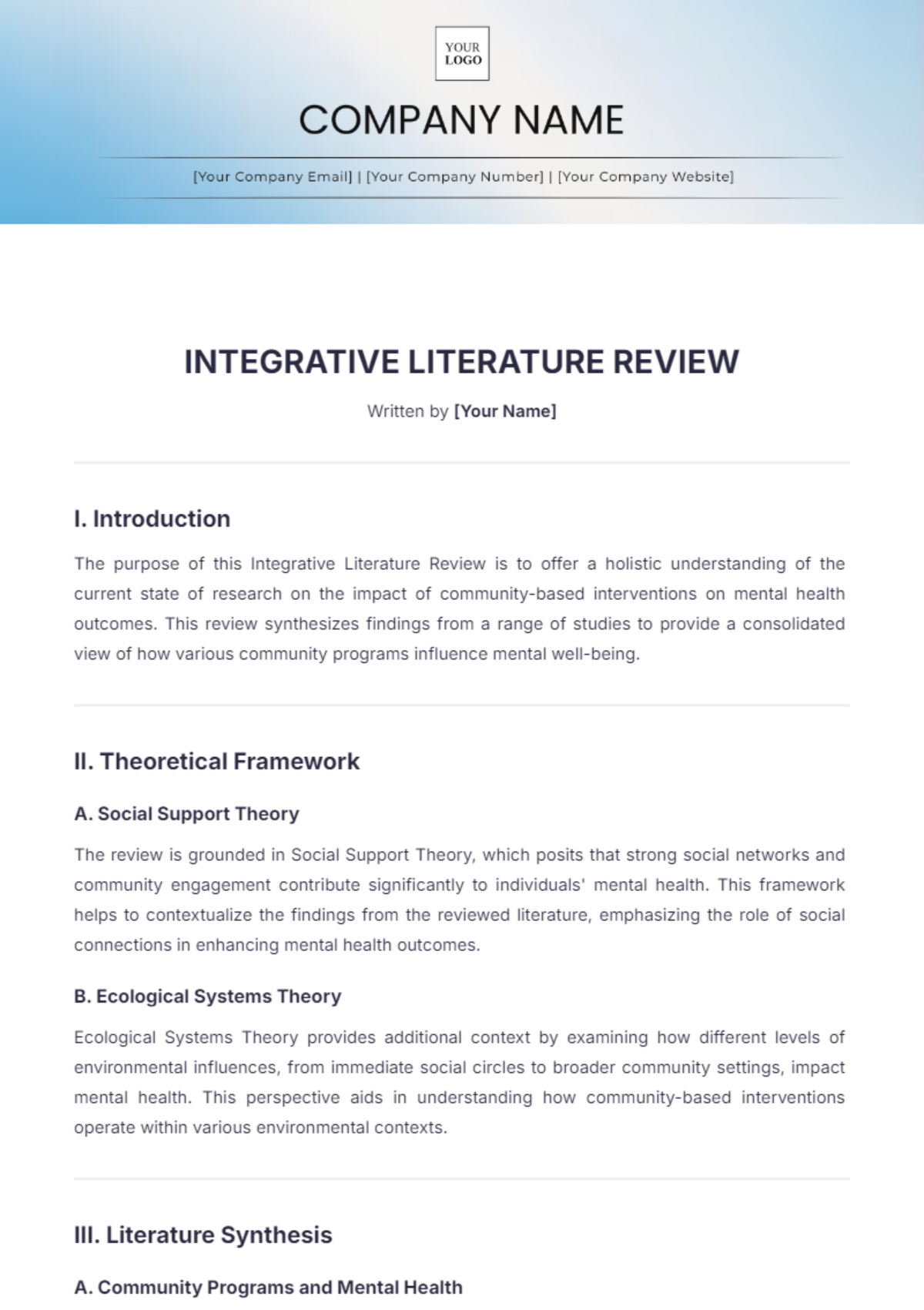
Written by [Your Name]
I. Introduction
The purpose of this Integrative Literature Review is to offer a holistic understanding of the current state of research on the impact of community-based interventions on mental health outcomes. This review synthesizes findings from a range of studies to provide a consolidated view of how various community programs influence mental well-being.
II. Theoretical Framework
A. Social Support Theory
The review is grounded in Social Support Theory, which posits that strong social networks and community engagement contribute significantly to individuals' mental health. This framework helps to contextualize the findings from the reviewed literature, emphasizing the role of social connections in enhancing mental health outcomes.
B. Ecological Systems Theory
Ecological Systems Theory provides additional context by examining how different levels of environmental influences, from immediate social circles to broader community settings, impact mental health. This perspective aids in understanding how community-based interventions operate within various environmental contexts.
III. Literature Synthesis
A. Community Programs and Mental Health
Research indicates that community programs, such as support groups and wellness initiatives, have a positive impact on mental health. For instance, a study by Smith et al. (2053) found that participants in community support groups reported lower levels of anxiety and depression compared to those who did not participate.
B. Variability in Intervention Outcomes
While many studies highlight positive outcomes, variability exists based on program type and participant demographics. For example, Jones and Lee (2052) found that wellness programs targeting young adults had different efficacy compared to programs aimed at older adults, suggesting a need for tailored interventions.
IV. Conceptual Analysis
A. Defining Key Concepts
Mental Health Outcomes: This term refers to various indicators of mental well-being, including emotional stability, life satisfaction, and resilience.
Community-Based Interventions: Refers to programs and initiatives designed to improve mental health through community involvement and support.
B. Interconnections Between Concepts
The analysis reveals that the success of community-based interventions is often linked to the strength and nature of social support within the community. The interplay between community engagement and mental health outcomes underscores the importance of fostering robust social networks.
V. Gaps and Future Directions
A. Identified Research Gaps
Despite the positive findings, there are gaps in understanding the long-term effects of community-based interventions. Few studies have examined how sustained participation impacts mental health over several years.
B. Suggested Future Research
Future research should focus on longitudinal studies to assess the long-term benefits of community programs. Additionally, exploring the differential effects of various types of interventions on diverse populations will provide more nuanced insights into program effectiveness.
VI. Conclusion
This Integrative Literature Review highlights the significant impact of community-based interventions on mental health outcomes, supported by Social Support Theory and Ecological Systems Theory. While the reviewed literature demonstrates the efficacy of these programs, further research is needed to explore long-term effects and the impact on different demographic groups. This review provides a solid foundation for future studies aimed at optimizing community programs to enhance mental well-being.
References
Smith, J., Brown, R., & Green, A. (2053). Impact of Community Support Groups on Anxiety and Depression. Journal of Mental Health Research, 27(3), 245-259.
Jones, L., & Lee, M. (2052). Efficacy of Wellness Programs Across Age Groups. Community Health Review, 15(2), 112-130.
- 100% Customizable, free editor
- Access 1 Million+ Templates, photo’s & graphics
- Download or share as a template
- Click and replace photos, graphics, text, backgrounds
- Resize, crop, AI write & more
- Access advanced editor
Introducing the Integrative Literature Review Template from Template.net, your ultimate tool for seamless academic writing. This highly customizable and editable template allows you to tailor each section to your needs. Easily editable in our AI Editor Tool, it simplifies the process of organizing and synthesizing research, saving you time while enhancing the quality of your literature reviews.







